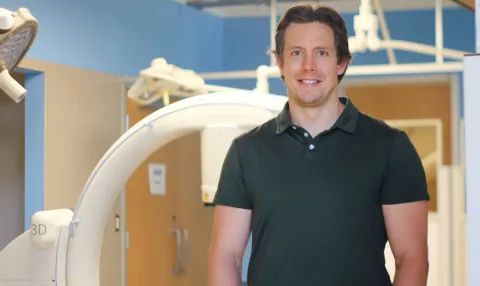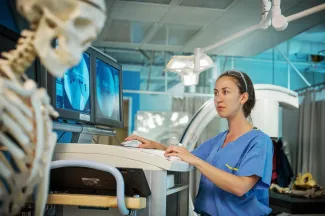"Innovation is a universal language."

David Stockton
- Degree:
- Master of Applied Science
- Grad year: 2020
- Program:
- Campus: Vancouver
My path to Biomedical Engineering was a little different than most. I was raised in Vancouver and went to the University of Victoria where I pursued a degree in Kinesiology. I have always been drawn to the mechanical principles that underpin the musculoskeletal system and human movement and was immediately drawn to Orthopaedics in the early years of my undergraduate medical training at the University of Toronto. I began residency training in Orthopedic Surgery at the University of British Columbia in 2014, and after completing three years I was accepted into the Clinician Investigator Program which enabled me to complete a master’s degree in Applied Science in Biomedical Engineering. I am currently in the final year of my residency training and will soon embark on a Fellowship in orthopaedic trauma in Baltimore, Maryland.
Outside of orthopaedic training and research, I enjoy spending time with my wife and our rambunctious two-year old daughter.
Why did you choose to go into your field of study at UBC?
During my second year of orthopaedic residency, I had the opportunity to travel to Uganda with the Uganda Sustainable Trauma Orthopaedic Program (USTOP). This program is a bilateral, longitudinal and educational partnership with Makerere University in Kampala. Multiple disciplines are involved including surgeons, nurses, physiotherapists and biomedical engineers (from the “Engineers in Scrubs” program). I talked with some of the students from the Engineers in Scrubs program that were on the trip and I had the opportunity to try out some of the devices that they were developing to aid orthopaedic trauma in under-resourced areas. I found the biodesign process fascinating. It involved creativity, pragmatism and had the potential to immediately impact patient care. At the same time, I was looking for a master’s program that would allow me to improve my research capabilities. Therefore, I made the decision to pause my orthopaedic training while I pursued a Master of Applied Science degree in Biomedical Engineering.
What has made your time at UBC memorable?
Three highlights stand out from the master’s program. First, I completed a thesis under Dr. Dave Wilson on the biomechanics of ACL injuries using the upright, open MRI at the Centre for Hip Health and Mobility. The project pushed my boundaries as a researcher especially with regards to basic biomechanics concepts, and we found some very interesting results using a novel imaging device. Second, the Engineers in Scrubs biodesign team that I was a member of developed a low-cost orthopaedic traction device that we successfully piloted on another USTOP trip to Uganda. We're now in the process of refining our design and raising money to expand to other centres. Last, but certainly not least, was the orthopaedic biomechanics class that I took which was taught by Dr. Tom Oxland. The experience of using my orthopaedic background to learn and solve problems alongside engineers was an inspiring experience which I hope will continue throughout my career as a surgeon.
What has been your most valuable non-academic experience studying at UBC?
One truly memorable experience was the trip to Uganda to pilot test the traction device that I helped develop in Engineers in Scrubs. We interacted with biomedical engineers from Makerere University and we learned a lot from their ingenuity. Innovation is a universal language, and we quickly found common ground trying to tackle the problem of how to assist Ugandan surgeons with intra-operative leg traction while they performed orthopaedic surgery. We developed personally and professionally on the trip, and we are indebted to the Faculty of Applied Science for the scholarship money that they awarded members of our team in order to make the trip possible.
Tell us about your experience in your program. What have you learned that is most valuable?
I learned that research, like innovation, is a long, arduous process that requires the collective support of many different individuals in order to achieve one’s goal. I must also mention the value of mentorship. Embarking on a master’s is a daunting prospect and it would not have been possible without the clear vision and support of the lead investigators on my project.
How are you applying the skills you learned through your studies at UBC?
Once I gained some proficiency in the imaging techniques required for my project, I started to think of more and more orthopaedic research questions that might be addressed by applying similar methodology. Understanding joint contact mechanics and alignment are key components to a successful recovery from many different orthopaedic injuries. There is much left to discover with regards to the influence of certain traumatic injuries and their effects on joint cartilage. I hope to investigate similar innovative imaging methods to yield discoveries that will benefit patients that suffer peri-articular injuries.
What advice would you give a student entering your degree program?
Set goals and work to achieve them. These may be short term, including specific tasks for the day or the week, or long term in terms of setting a timeline to write and publish a paper. Staying focused on my list of priorities helped me seek the help I needed, budget my time and stay on track.
How do you feel your degree has benefitted you compared to a different field of study?
I’ve been working and studying in the field of orthopaedic surgery for a few years now, so I was looking to complement my existing knowledge with a stimulating and challenging master’s program. Popular graduate degrees that have bolstered other surgeons’ careers include epidemiology, public health and adult education degrees. Knowledge in these areas is critical to designing and moving clinical orthopaedic research and education forward. Since there is growing competence in these areas among Canadian orthopaedic surgeons already, I decided to pursue a more basic science path in a field that gets to the core of orthopaedic surgery, that is, the biomechanical and engineering principles behind musculoskeletal injury and modern fixation implants and techniques. I am hoping that I will be able to apply an engineering lens to orthopaedic research in the future, leading to improved techniques and implants that will ultimately benefit patients.
Where do you find your inspiration?
My family! At the end of the day my goal is to help raise a happy, healthy family that does some good in the world. Spending quality time with my family reminds me of what’s really important.
What are your immediate and/or long-term plans for the future?
I’m currently in the last year of residency in orthopaedic surgery. Once I’ve obtained the specialist certification to work as a surgeon, I am heading to Baltimore, Maryland to spend a fellowship year at a trauma hospital there called the Shock Trauma Centre. Following that year, my goal is to work as an orthopaedic trauma surgeon and also to be involved in clinical and basic science research.
What are your future plans to make a difference in our world?
I prefer to focus on the journey, not the destination. John Wooden, who many judge to be the best NCAA basketball coach in history, offered this advice: “You know where you’d like to go, whether it’s to a national championship in basketball or a particular goal in life. You must also realize that this goal will be simply a by-product of all the hard work and good thinking you do along the way.”
Making a difference in the world sounds like a daunting task to me. I’d rather focus on what I can do on a daily basis: pitch in around the house, help my daughter learn the alphabet, perform a technical surgery proficiently, design a new study or help teach orthopaedic principles to junior medical students and residents. If I can focus on many small contributions as a husband, father, surgeon, researcher, and educator then hopefully the outcome will take care of itself.



